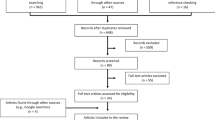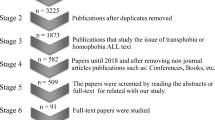Abstract
This research examines the response of employers to the Americans with Disabilities Act (ADA), with a specific focus on the employment of those with mental disabilities. A telephone survey was completed in a metropolitan area in the southern United States with a random sample of 117 businesses. In terms of specific practices that indicated compliance with the ADA, 15% had specific policies for hiring those with mental disabilities, and 37.6% had indeed hired such individuals. Companies that had complied with the ADA were more likely to be large and to have specific policies for the hiring of minorities and those with physical disabilities. Employers also did not believe that employment of those with mental disabilities was their responsibility, and supported increased efforts by the rehabilitation community to improve employment opportunities for individuals with mental disabilities. Mental health service providers need to work more closely with employers in their regions and educate them about the capabilities of individuals with mental disabilities, and inform employers that the types of accommodations necessary are neither costly nor difficult to implement.
Similar content being viewed by others
References
Bonnie RJ, Monahan J (Eds.):Mental Disorder, Work Disability and the Law. Chicago: University of Chicago Press, 1997.
Hall FS, Hall EL: The ADA: Going beyond the law.Academy of Management Review 1994; 8:17–26.
Link BG: Mental patient status, work, and income: An examination of the effects of a psychiatric label.American Sociological Review 1987; 47:202–215.
Link BG, Mirotznik J, Cullen FT: The effectiveness of stigma coping orientations: Can negative consequences of mental illness labelling be avoided?Journal of Health and Social Behavior 1991; 32:302–320.
Yelin EH, Katz PP: Making work more central to work disability policy.The Milbank Quarterly 1994; 72:593–619.
Zuckerman D: Workplace accommodations. In: Perry J (Ed.):Mental Disabilities and the ADA: A Practitioner's Guide to Employment, Insurance, Treatment, Public Access and Housing. Washington, DC: The American Bar Foundation, 1994, pp. 25–30.
Gerhart UC:Caring for the Chronically Mentally Ill. Itasca, IL: F. E. Peacock, 1990.
Dilling H, Weyener S: Psychiatric illness and work capacity. In: Robins LN, Clayton PJ, Wing JK (Eds.):The Social Consequences of Psychiatric Illness. New York: Brunner/Mazel, 1980, pp. 229–247.
Anthony W, Blanch A: Supported employment for persons who are psychiatrically disabled: An historical and conceptual perspective.Psychosocial Rehabilitation Journal 1987; 11:5–23.
Wansbrough N, Cooper P:Open Employment after Mental Illness. London: Tavistock, 1980.
Scheid TL: An investigation of work and unemployment among psychiatric clients.International Journal of Health Services 1993; 23:763–782.
Sullivan WP: “It helps me to be a whole person”: The role of spirituality among the mentally challenged.Psychosocial Rehabilitation Journal 1992; 16:125–134.
Lang SK, Cara E: Vocational integration for the psychiatrically disabled.Hospital and Community Psychiatry 1989; 40:890–892.
Hirsch SW: Meeting the vocational needs of individuals with psychiatric disabilities through supported employment.Journal of Rehabilitation 1989; 55:26–31.
Scheid TL, Anderson C: Living with chronic mental illness: Understanding the role of work.Community Mental Health Journal 1995; 31:163–176.
Bachrach LL: Perspectives on work and rehabilitation.Hospital and Community Psychiatry 1991; 42:890–891.
Cook JA, Razzano L: Natural vocational supports for persons with severe mental illness. In: Stein L (Ed.):Innovative Community Mental Health Programs. San Francisco: Jossey-Bass, 1992, pp. 23–41.
Storey K, Horne RH: Social interactions in three supported employment options: A comparative analysis.Journal of Applied Behavior Analysis 1991; 24:349–360.
Link BG, Dohrenwend BP, Skodol AE: Socio-economic status and schizophrenia: Noisome occupational characteristics as a risk factor.American Sociological Review 1986; 51:242–258.
Midgley G: The social context of vocational rehabilitation for ex-psychiatric patients.British Journal of Psychiatry 1990; 156:272–277.
Susman J: Disability, stigma and deviance.Social Science and Medicine 1994;38:15–22.
Goffman E:Asylums. Garden City, NY: Anchor Books, 1961.
Monahan J: “A terror to their neighbors”: Beliefs about mental disorder and violence in historical and cultural perspective.Bulletin of the American Academy of Psychiatry and Law 1992; 20:191–196.
Ravaud JD, Madiot B, Ville I: Discrimination towards disabled people seeking employment.Social Science and Medicine 1992; 35:951–958.
Manning C, White PD: Attitudes of employers to the mentally ill.Psychiatric Bulletin 1995; 19:541–543.
Braddock D, Bachelder L:The Glass Ceiling and Persons with Disabilities. Washington, DC: Glass Ceiling Commission, U.S. Department of Labor, 1994.
Farina A, Felner RD: Employment interviewer reactions to former mental patients.Journal of Abnormal Psychology 1973; 82:268–272.
Webber A, Orcutt JD: Employer's reactions to racial and psychiatric stigmata: A field experiment.Deviant Behavior 1984; 5:327–336.
Crist PAH, Stoffel V: The ADA of 1990 and employers with mental impairments: Personal efficacy and the environment.American Journal of Occupational Therapy 1992; 46:434–443.
Essex-Sorlie D: The Americans with Disabilities Act: I. History, summary and key components.Academic Medicine 1994; 69:519–524.
Reed KL: History of federal legislation for persons with disabilities.American Journal of Occupational Therapy 1992; 46:397–408.
Hantula DA, Reilly NA: Reasonable accommodation for employees with mental disabilities: A mandate for effective supervision?Behavioral Sciences and the Law 1996; 14:107–120.
Hall LL: Making the ADA work for people with psychiatric disabilities. In: Bonnie RJ, Monahan J (Eds.):Mental Disorder, Work Disability and the Law. Chicago: University of Chicago Press, 1997, pp. 241–280.
Rybski D: A quality implementation of Title I of the ADA of 1990.American Journal of Occupational Therapy 1992; 46:409–418.
Kaufmann CL: Reasonable accommodation for mental disabilities at work: Legal constructs and practical application.Journal of Psychiatry and Law 1993; 21:153–174.
Haimowitz S: ADA of 1990: Its significance for persons with mental illness.Hospital and Community Psychiatry 1991; 42:23–24.
Mancuso LL: Reasonable accommodation for workers with psychiatric disabilities.Psychosocial Rehabilitation Journal 1990; 14:3–19.
Lou Harris & Associates:The ICD Survey II: Employing Disabled Americans: A Nationwide Survey of 920 Employers. Study No. 864009. New York: Lou Harris & Associates, 1987.
Hayden MJ: Disability awareness workshop: Helping business comply with the ADA of 1990.American Journal of Occupational Therapy 1992; 46:461–465.
Author information
Authors and Affiliations
Corresponding author
Rights and permissions
About this article
Cite this article
Scheid, T.L. The Americans with disabilities act, mental disability, and employment practices. The Journal of Behavioral Health Services & Research 25, 312–324 (1998). https://doi.org/10.1007/BF02287470
Issue Date:
DOI: https://doi.org/10.1007/BF02287470




